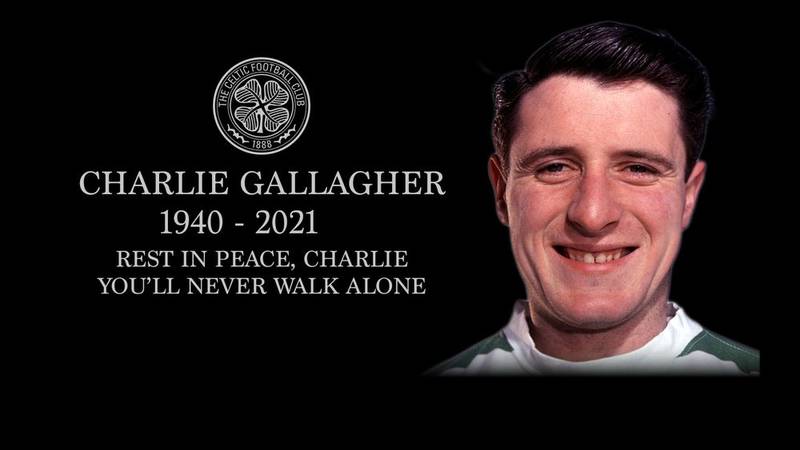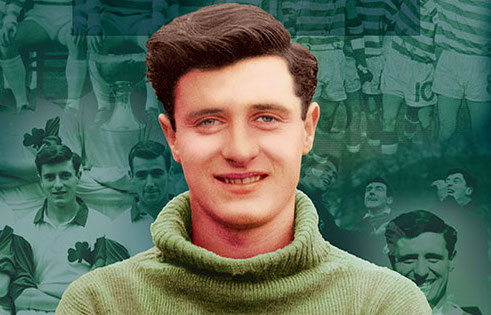Mike Maher currently living in New Zealand sent this testimonial of his recollections of Charlie Gallagher.
“The name Charlie Gallagher takes me back to my first days of being a Celtic Supporter. I look upon the month of October 1960 as the time I became a real Celtic fan. Up until then I was interested in Scottish Football in general rather than any one team in particular. At that point I had no inkling my father was a Celtic man. Although Celtic Park was only a short distance away I had no recollection of him ever talking about going there.
At school many of my mates claimed to be fans of St Mirren, Clyde, Motherwell, Hearts and the like. In those more competitive times these were teams who had more recent success than Celtic. However my best friend-Peter Dickson – was a Celtic fan and one day he told me excitedly that Willie Fernie had returned to Celtic. I had never heard of Willie Fernie but Peter’s excitement was enough for me and a couple of days later for the first time in my life I made a point of looking out for the Celtic result as soon as possible on a Saturday evening.
That turned out to be a 4-2 win over St Mirren. I was off to a good start! For the next few months I avidly checked the Celtic scores and reports and even saw a few highlights of their games on Saturday night Scotsport. Not that the results were always positive. By the end of 1960 Celtic were sitting 12th in an 18 Club division. Not in the hunt for the title. That was for big teams like Rangers, Hearts, Dundee, and Kilmarnock. So it was with some concern that I awaited the result of our game on the last day of the year at home to the Ayrshire side.
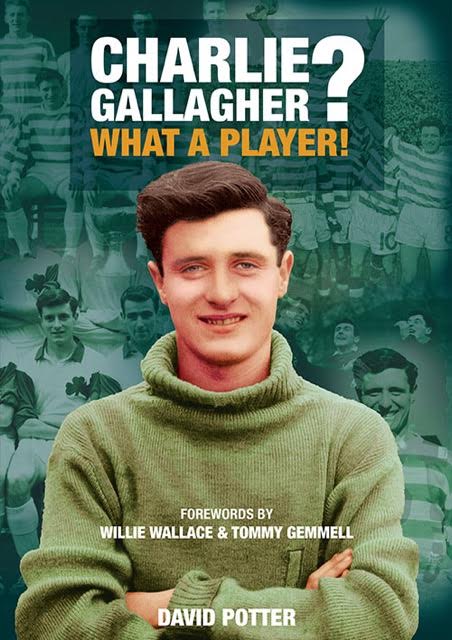
When the score came through I was delighted (at least at the time). We had won 3-2. When I read the reports I found out that Killie had been 2 goals up at one stage but Celtic had staged a comeback and that Charlie Gallagher had scored the winner in the 85th minute. One report told how his shot was so powerful it had torn the net. Another said he might be the “New Patsy”. As I had never heard at that point of the old Patsy the reference was lost on me.
Anyway I had not even heard of Charlie Gallagher. As a relatively new fan I was only getting to know the usual line-up but this was a new name to me. I found out he was only 20 and he had played a couple of times before but not with this impact.
That Kilmarnock result gave me hope for the next game 2 days later – Rangers at Ibrox. My first Old Firm game. No live coverage so I gathered with uncles, aunts and cousins in my granny’s prefab to watch the highlights on a special edition of Scotsport on the evening of 2 January 1961. Despite his goal against Killie Charlie dropped out and his place at inside-left was taken by the more experienced Willie Fernie.
The game was typical of the times. Celtic scored after 28 minutes. They had a goal disallowed and missed a few chances. Rangers then took advantage of Celtic errors and score twice in the second half to win 2-1. I would get
used to this type of performance over the next few years!
Five days later Charlie returned to the team for the home game with Third Lanark. For me though there was another reason to remember this match. My first ever Celtic game. Up until then I had got my football fix by either playing with my friends or watching the St Bridget’s Boys Guild team. Peter’s father helped run the team and often Peter and I “assisted” him.
On Friday evenings we would “dubbin” the balls and on Saturdays was the job I loved. We would go down to a local joiners and pick up a big bag of sawdust which we would use to line the park. However on that bitterly cold January morning Peter’s father told us the Boys Guild game was off.
Would we like to go to see Celtic instead? Would we?!?!? I could not believe it. At last I was going to see Celtic. I ran home to tell my parents. Nobody was home so I left a note on the sideboard. Nowadays it would seem incredible but in those days I usually went out after breakfast and came back whenever I felt hungry or tired. I never had a key. The back door was always left open. Anyway after leaving the note in the empty house I raced back to Peter’s.
His uncle was there with his wee van and soon the 4 of us were making the short trip to Paradise. Peter and I were lifted over and we made our way around the Rangers End. We took a spot beside the green iron railing that separated that part of the ground from the Jungle. Beside us was a cinder track leading to a large sliding door which was opened to admit invalid cars into the ground and at the end was used as an exit gate.

Then the teams came out. I was stunned! Up until then I had never seen Celtic in colour. Newspapers and television were in black and white. I knew Celtic wore green and Thirds wore red but that did not do justice to the hues I saw that day. It was a dark, cold day and the floodlights were on.
Celtic’s shirts were of dazzling emerald, Third Lanark wore a vivid scarlet. It was like Technicolor! I realised then how football transformed the lives of ordinary people. My Glasgow and Lanarkshire were monochrome places. Grey skies over grey roofs. Grey buildings on grey pavements and grey roads. Grey people wearing grey clothes. But for a couple of hours on a Saturday our lives were full of colour.
On this occasion Charlie played outside right but my first game did not have a happy ending. Although Celtic scored first the Hi Hi won 3-2. I have often wondered if anyone in the 22,000 crowd that day could have imagined that in little more than 6 years Celtic would be champions of Europe and Third Lanark would be out of existence!
Charlie retained his place in the team after that and results started to pick up a bit. We defeated Falkirk at Brockville in the first round of the Scottish Cup which gave us a home tie with Montrose. Peter and I decide
we had to be there. After our “debut” against Third Lanark we had not been back to Celtic Park. Peter’s father had other duties on a Saturday.

We knew our parents would not allow us to go a game unaccompanied so there was only one thing to be done. We would have to lie! Another friend – Phil Dolan- joined us in our deceit and it was to his house we went first. Phil told his parents we were going to the afternoon matinee at the Shettleston Odeon and he needed some pocket money. No problem. Next stop was Peter’s and the same result. Finally to my place. Initially I spun the same line to my mother but then my conscience butted in. I blurted out the truth. We were actually intending to go to Celtic Park.
“Well I will need to tell your father about this” she said as she left the kitchen. The other 2 scowled at me. Now we were in trouble. Not only would we miss the game but our parents would find out about the lies. A few moments
later my father came in. “So you were planning to go the Celtic game?” We nodded solemnly. ‘Well come on then- let’s go” he said. For a few seconds we were stunned and then gleefully getting into the little Ford Anglia to
head to Paradise.
My father could not lift us all over so he waited inside while we came through the Boys Gate. He took us into the enclosure in front of the main stand. That cost an extra sixpence each but it meant he could keep an eye on us easier and the incline there gave a better view than from the terracing. We were almost in line with the goal line and thus had a great view of the goals. Almost from the kick off Celtic won a corner on the right. Tactics were simple then. A corner in that area was taken by the outside right. We had a close up view therefore of Charlie Gallagher sending in the corner. He flighted the ball so well that it caused confusion in the goalmouth with a Montrose defender knocking the ball into his own net. Celtic had a comfortable 6-0 win.

That trip seemed to re-kindle my father’s interest and we started making regular trips to Parkhead. During the next few months we were regulars in Paradise and I even got to my first away game at Dens Park. Celtic were fielding a more settled team with Charlie a regular at outside right. We ended up 4th in the league table behind Rangers, Kilmarnock and Third Lanark. The Ibrox outfit had finished 1 point ahead of Kilmarnock. I could not help but thinking now that maybe I should have not celebrated that comeback win over the Ayrshire team on the last day of December!
It was with the Scottish Cup though that our hopes of glory rested. We had reached the final and only lowly Dunfermline stood in the way of silverware. However things did not go as planned and the Fifers lifted the Cup. That was the first time I had heard of Jock Stein and we would need to wait another few years before he returned to Paradise to lead us to glory.
In April 1965 my trip to Hampden for another Cup Final against Dunfermline was much different from the 1961 version. Instead of being taken by my father I went on a football special train with schoolmates. We took our spot on the terracing just in front of the floodlight pylon at the Celtic End on the Sommerville Drive side of the ground. Over the next decade we would get used to this spot. We were very confident but after 15 minutes the Pars scored and doubts were beginning to creep in. Then just after the 30 minute mark Charlie Gallagher stepped in. He drove forward from midfield and hit a fierce shot from distance. It thudded the crossbar and went straight up in the air. When it came back down Bertie Auld knocked it into the net for the equaliser.

Dunfermline regained the lead just before half time but Celtic equalised 7 minutes after the break. And then with 9 minutes to go Celtic won a corner on the left. Our tactics had changed from that first Scottish Cup tie I had witnessed. Instead of the outside left taking the kick it was entrusted to someone with real accuracy. Charlie stepped up, delivered the perfect cross for big Billy and the rest as they say is history.
Over the next few years Charlie Gallagher was one of the squad who took Scotland and Europe by storm. And yet he did not play as many times as I thought he should. He did figure in lots of games in 1965/66 and I recall yet another of his great corners letting Steve Chalmers put us in the lead in the Ne’erday Old Firm game which we went on to win 5-1. In our great 1966/67 season his appearances were down and he only played in 2 European games. One of those would give him most famous place in Celtic history.
In the dying seconds of our second leg quarter final against Vojvodina Novi Sad with the teams tied at 1-1 Celtic won a corner on the right. By now I had graduated to the Celtic End as part of the Celtic Choir. Despite the distance from the far side of the ground I could see Charlie’s accurate cross pick out Billy McNeill who headed home to put us into the semi-final.
In the 1967/68 season Charlie only played 2 League Cup games in the entire first half of the season. He did not get a real run in the team until the following February. I seem to recall Bertie Auld picked up an injury and Charlie took the chance to get a regular place. For the next few months he played some of his best football and was a main reason for Celtic clinching the title.
Despite those performances Charlie dropped out of the picture the following season rarely appearing in the first team and after no games at all in the 1969/70 season he left on a free transfer just a few days before the European Cup Final in Milan. However that was not the last experience I had of Charlie Gallagher.
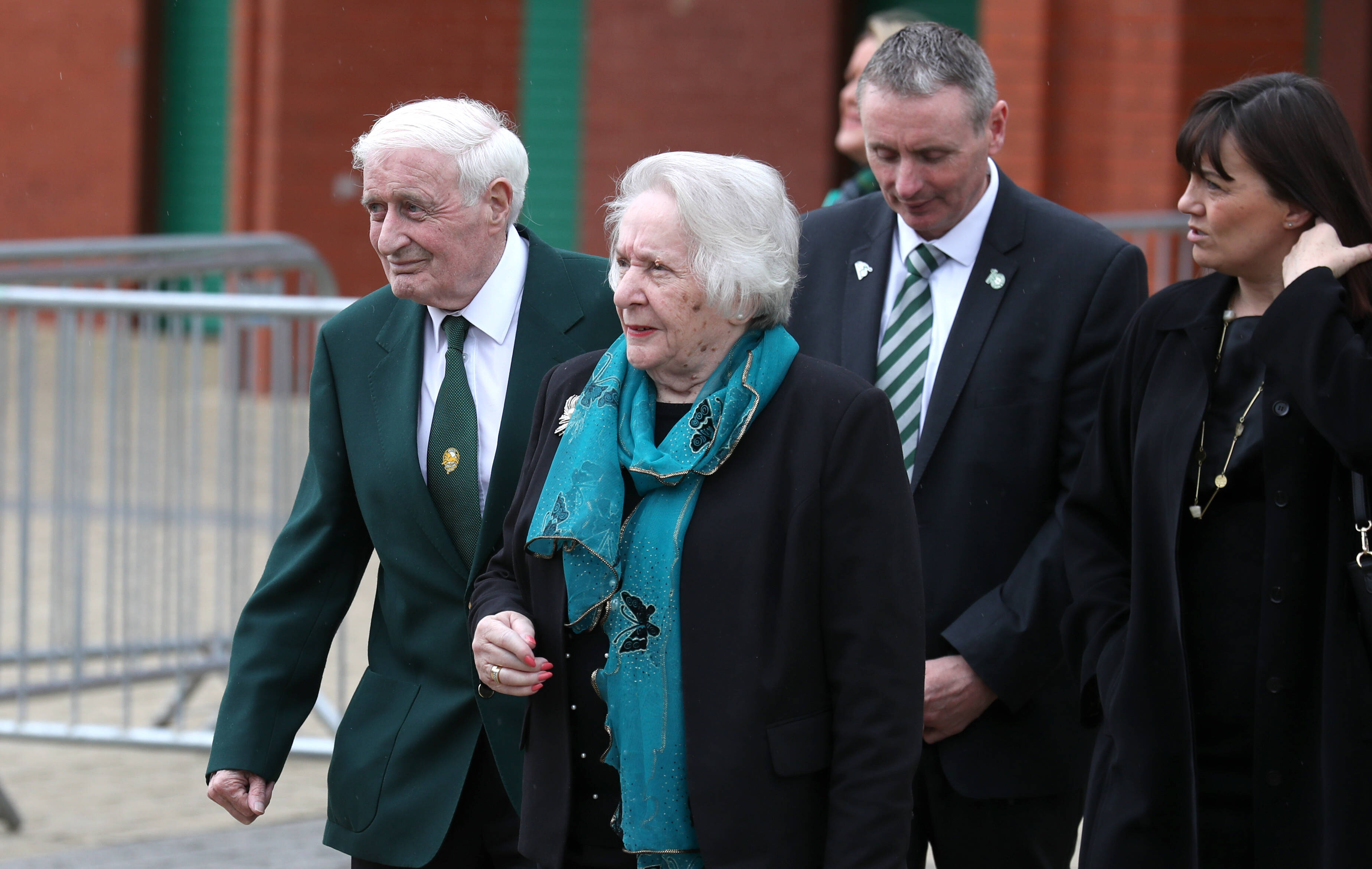
He went to second division Dumbarton and almost inevitably came up against Celtic a few months after his departure. This was in the League Cup semi-final at Hampden. Celtic were expected to win comfortably. However Charlie gave a man of the match display that helped the part timers secure a 0-0 draw. In the replay Celtic were 2 goals up when Charlie scored from the spot and inspiring the “Sons” to equalise before Celtic sneaked through 4-3 after extra time.
Charlie had picked up a couple of Irish caps and this along with his performances meant he was always popular with the fans. I sometimes heard him referred to as “Bridie” (after the popular Donegal singer Bridie Gallagher whose song “the Boys from the County Armagh” was often heard on Celtic buses in those days). However I always thought that nickname was one of endearment rather than an indication of his lack of strength. I did wonder though if big Jock had reservations about Charlie’s “frailties”. Despite his ability he never seemed to be a real regular and even in that great run he had in 1968 he was still often substituted.
Indeed I think Charlie’s problem may have been he was too nice. I have never played professional football but I suppose it is not too different from the amateur game insofar as no one likes to be substituted. I often thought
that coaches would pick the easiest going guy to come off rather than have the hassle of dealing with a moaner!
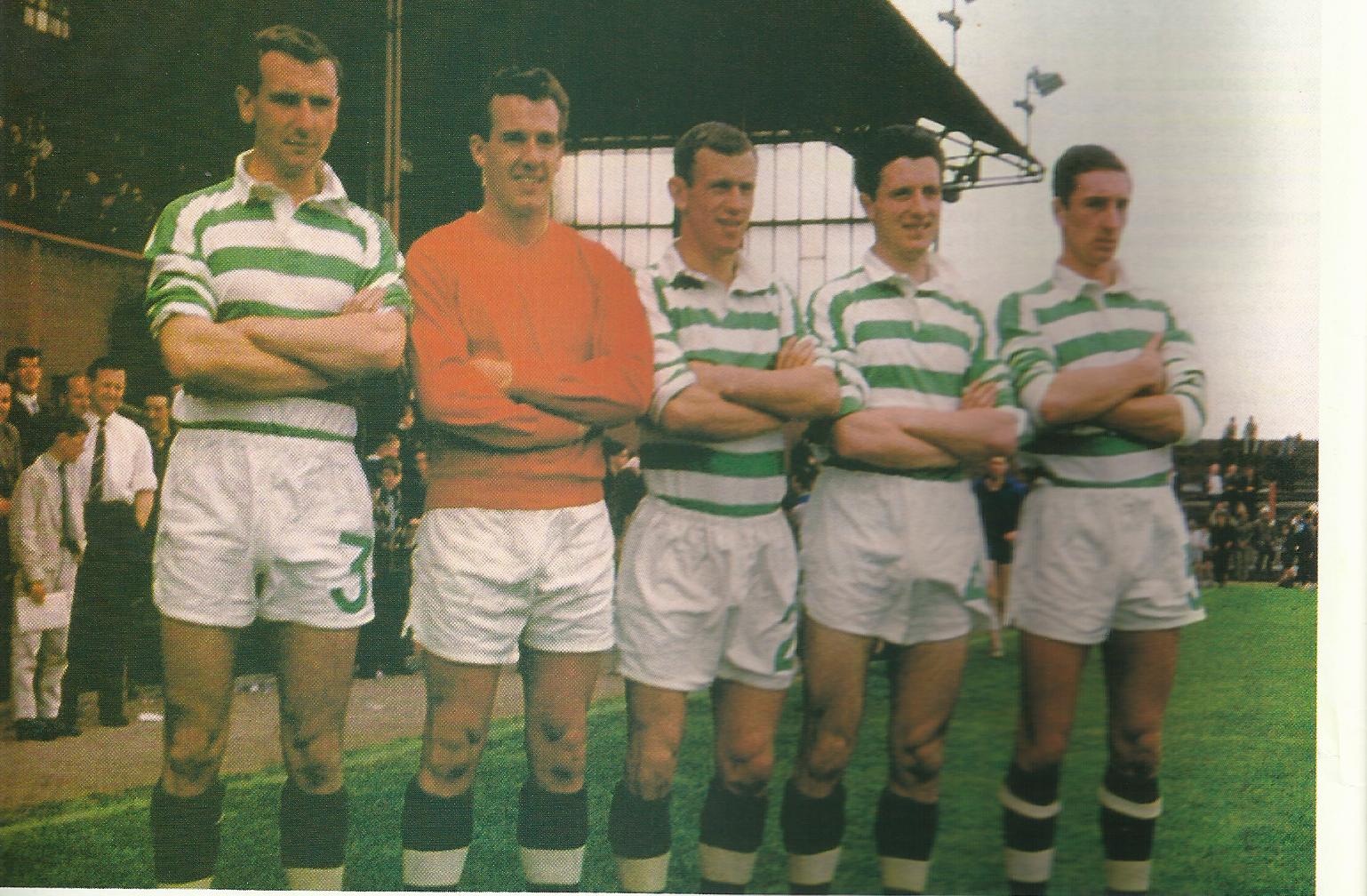
I often thought too that maybe Charlie should have left Celtic sooner. If he had opted to leave at the end of the 1967/68 season he would easily have got into any other of the top Scottish sides (apart from one of course
although their lack of interest in him would have had nothing to do with his ability!) As a regular choice his confidence would have grown and so therefore would his performance levels.
On the other hand he was a Glasgow boy with a proud Irish background. That resonated with so many of the Celtic Supporters. Would they have walked away from Celtic? Charlie certainly didn’t and that is why after all these years he is still considered one of the Celtic legends.”
The late Bob Crampsey who taught Charlie at Holyrood and then had a wide and varied career in football journalism and punditry had this to say about Charlie “a quiet lad, perfectly behaved and a little bit shy…a footballer more typical of the 1940s and 1950s, very talented but a little too self-effacing to be a star…a superb striker of the ball…a credit to the sport in every way”.
Tom Campbell, using his knowledge of American football and also Celtic in the 1950s, explains the similarities and the differences between Auld and Gallagher “both were used by Stein in much the same way as American football teams employ quarter backs; the organiser, the brains, the schemer, the planner, behind all attacking play. It is imperative that the quarter-back (always the highest paid player) be protected at all times. Auld and Gallagher were quarter-backs and had to be given extra protection – but for different reasons: Auld, competitive and aggressive, latterly needed a little more time to work his magic; Gallagher, more intellectual and perhaps artistic, required physical protection…Auld, intelligent as he was, was always a scrapper (like Bobby Collins), Gallagher, equally intelligent was much less so (like Willie Fernie).
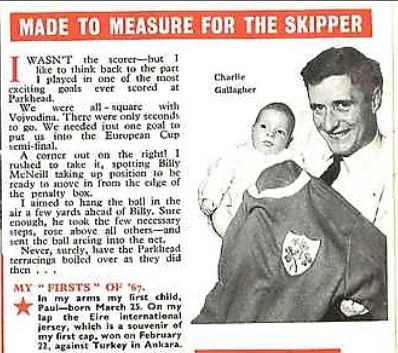
The late Angus Potter (a veteran supporter of the 1920s) would allow Charlie Gallagher to be mentioned in the same breath as Patsy Gallacher and Tommy McInally, and described him laconically but effectively “Charlie Gallagher? Now he IS a football player!”
Pat Woods, a renowned Celtic historian and collector of Celtic memorabilia says, “If Charlie has a fault, it lies in his modesty about his football ability. In the decade or so that I watched him playing for Celtic, he always impressed me both as a fine passer and a peerless striker of the ball, attributes which gave the appearance of being effortless in their achievement. His contribution to Celtic ending their trophy famine by winning the Scottish Cup in 1965 has been a shade undervalued. I can still recall standing high up on the King’s Park End terracing at Hampden and being gobsmacked by the sheer drama of it all as his ferocious 30 yarder cracked off the
crossbar, the ball soaring into the air before coming down for Bertie Auld to bundle it over the line for Celtic’s first equaliser.
That memory of the Final against Dunfermline Athletic tends to be supplanted (pardonably so, perhaps) by the fairy tale Billy McNeill winner fashioned by Charlie’s corner taking expertise, a “routine” that was repeated in the dying seconds against Vojvodina in the European Cup quarter final second leg at Parkhead two years later. Believe me, no Celtic fan present that night would have been happy with a play-off against those tough Yugoslavs in Rotterdam. I recent said in jest to Charlie that there should be plaques at the appropriate spots in both grounds to commemorate these feats. Charlie just smiled, but who would question an assertion that his prowess effectively opened the doors to both the greatest era in the club’s history and to its greatest triumph?”
Danny McGrain, arguably Celtic’s best ever full back says “One of the benefits of Charlie Gallagher playing in the reserve team so often was that he was able to be our mentor. His presence was re-assuring, and he always had the ability and willingness to help us out. We owe him a great deal”.
Maureen Andrew, Spanish teacher and supporter of many years says “Charlie Gallagher? What a player!”…
David Potter
